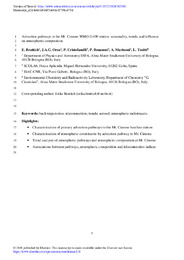Please use this identifier to cite or link to this item:
https://hdl.handle.net/11000/35184Full metadata record
| DC Field | Value | Language |
|---|---|---|
| dc.contributor.author | Garcia Orza, Jose Antonio | - |
| dc.contributor.author | Brattich, Erika | - |
| dc.contributor.author | Cristofanelli, Paolo | - |
| dc.contributor.author | Bonasoni, Paolo | - |
| dc.contributor.author | Marinoni, Angela | - |
| dc.contributor.author | Tositti, Laura | - |
| dc.contributor.other | Departamentos de la UMH::Física Aplicada | es_ES |
| dc.date.accessioned | 2025-01-23T20:07:18Z | - |
| dc.date.available | 2025-01-23T20:07:18Z | - |
| dc.date.created | 2020 | - |
| dc.identifier.citation | Atmospheric Environment | es_ES |
| dc.identifier.issn | 1878-2442 | - |
| dc.identifier.issn | 1352-2310 | - |
| dc.identifier.uri | https://hdl.handle.net/11000/35184 | - |
| dc.description.abstract | Relationships are analysed between advection pathways and atmospheric composition at the high-mountain station of Mt. Cimone (Italy), between 1998 and 2011. Back-trajectory cluster analysis identifies eight main advection pathways. A connection is demonstrated between the seasonality of airmass transport and atmospheric composition. Temporal trends and correlation of variables, flow types and teleconnection indices show, among other, decreasing trends of 210Pb (a radionuclide of crustal origin; −0.008 mBq m−3 year−1) as well as PM10 (−0.15 μg m−3 year−1), indicating that previously observed downward PM10 trends in Europe may actually be attributable to a combination of meteorological factors and decreasing anthropogenic emissions. The detection of a positive (negative) correlation of these tracers with Western (Arctic) air masses, showing significant downward (upward) trends at the study site, further confirms our findings. Lastly, relationships between teleconnection indices and atmospheric transport types/atmospheric variables are further analysed, focusing on large-scale atmospheric circulation indices and regional low-frequency atmospheric circulation pathways, the Mediterranean Oscillation and the Western Mediterranean Oscillation. The analysis reveals the important influence of such regional indices on the advection pathways. | es_ES |
| dc.format | application/pdf | es_ES |
| dc.format.extent | 42 | es_ES |
| dc.language.iso | eng | es_ES |
| dc.publisher | Elsevier | es_ES |
| dc.relation.ispartofseries | 234 | es_ES |
| dc.rights | info:eu-repo/semantics/openAccess | es_ES |
| dc.rights | Attribution-NonCommercial-NoDerivatives 4.0 Internacional | * |
| dc.rights.uri | http://creativecommons.org/licenses/by-nc-nd/4.0/ | * |
| dc.subject | back-trajectories | es_ES |
| dc.subject | teleconnection | es_ES |
| dc.subject | trends | es_ES |
| dc.subject | aerosol | es_ES |
| dc.subject | atmospheric radiotracers | es_ES |
| dc.subject.other | CDU::5 - Ciencias puras y naturales::53 - Física | es_ES |
| dc.title | Advection pathways at the Mt. Cimone WMO-GAW station: Seasonality, trends, and influence on atmospheric composition | es_ES |
| dc.type | info:eu-repo/semantics/article | es_ES |
| dc.relation.publisherversion | https://doi.org/10.1016/j.atmosenv.2020.117513 | es_ES |

View/Open:
1-Preprint-OpenDocument-Q1-Brattich-AdvectionPathwaysMtCimone-1-s2.0-S1352231020302508-am.pdf
Preprint
1,78 MB
Adobe PDF
Share:
.png)
